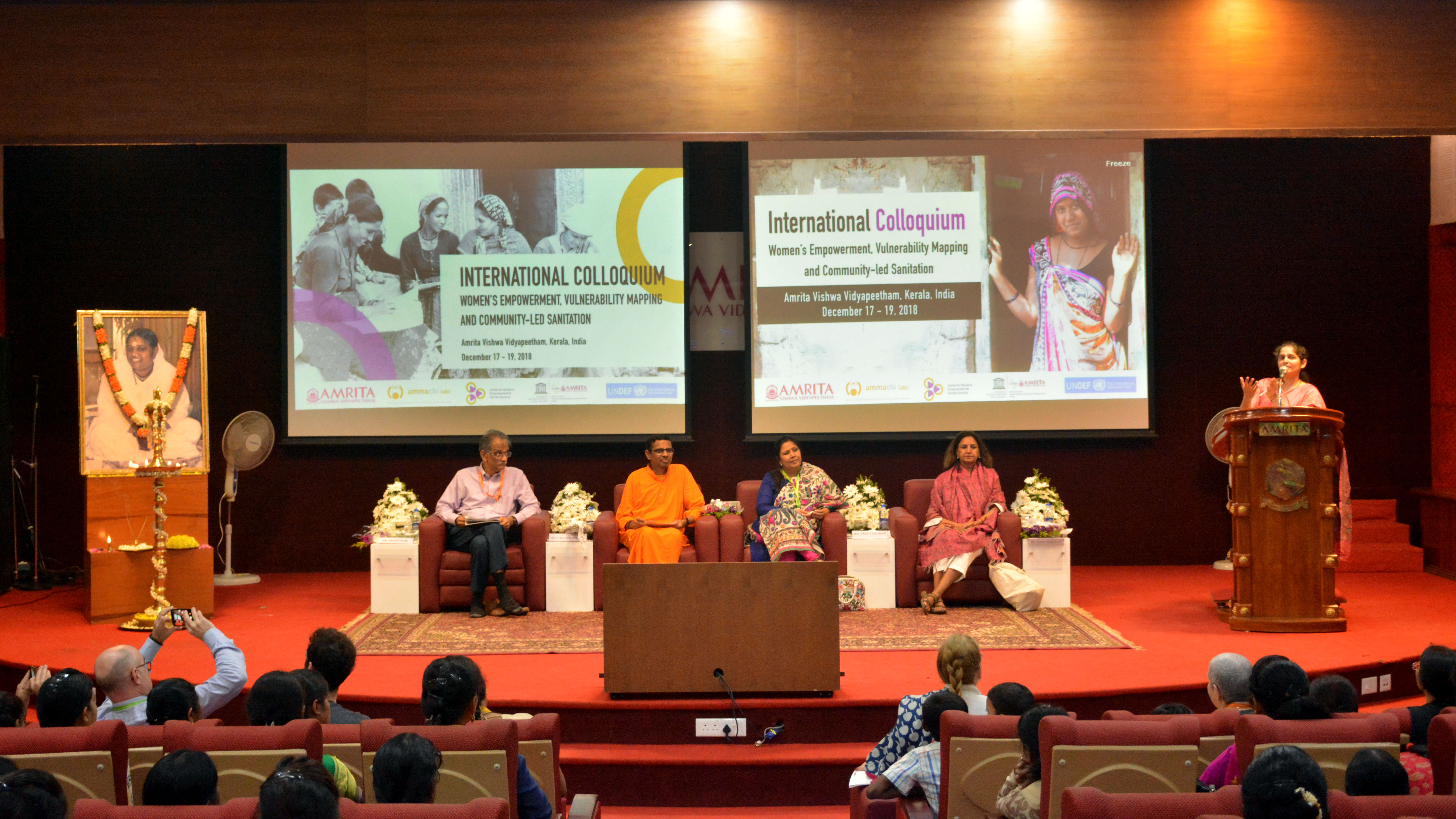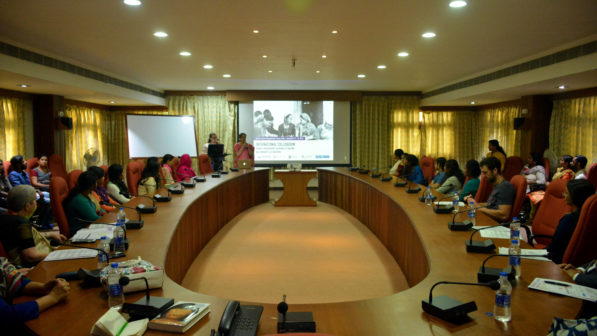Amrita Vishwa Vidyapeetham’s UNESCO Chair in Gender Equality hosted its first International Colloquium for Women’s Empowerment.This was a Capstone Event for the UNDEF Project: “Women’s Empowerment Community Sanitation Through Democratic Participation.”
The capstone event celebrated the project success and shared their success stories and opinions on key issues at the forum. Hosted by Amrita’s UNESCO Chair in Women’s Empowerment & Gender Equality—the first such chair in India–– this colloquium was also the first of its kind in India that highlighted the successful skill training programs of AMMACHI Labs in the area of women’s empowerment.
Keynote speakers included Dr. Deepa Narayan, international poverty, gender and development advisor and renowned author and speaker; the Honourable Judge Swati Chauhan, judicial officer and founder of Swayamsiddha an initiative for women; Smt. Shalini Prasad, UNICEF; Andy Carmone CNM MPH, global health expert and Director of Clinical Science at Clinton Health Access Initiative; and many other top delegates from UN agencies, and other NGOs.
There were roundtable discussions, invited paper presentations, and workshops that highlighted these topics. “The colloquium provided a shared platform for experts from international NGOs, GOI officials, high level judges and research scholars from around the world, along with women from the grassroots level, to share their knowledge about key issues in women’s empowerment and vulnerabilities,” said Prof. Bhavani Rao, the Amrita UNESCO Chairholder. “It was inspiring to see so many women from all strata of society take part in this remarkable event and then come together in a unified voice to further women’s empowerment.”
In her keynote speech, Dr. Deepa Narayan spoke about the importance of women speaking up. “Voice is one of the most powerful things that we have. And yet women are told to speak softly—or not to speak at all. Reclaiming voice is important because without voice one is not really human and there is no empowerment.” At the Capstone Event for the UNDEF Project, representatives from women’s advocacy self-help groups from project villages presented their findings on key issues in their communities and took part in a discussion on the Joint Policy Brief formation. “Before this, many of these women had never ventured outside of their small communities, interacted with government officials or made efforts to improve the situation in their village,” said Prof. Bhavani. “Now they are so bold and able to speak publicaly about issues in their communities and find solutions through dialogue.”
The UNDEF project offered intensive skill training programs on women’s health, clean water and sanitation topics, community development, financial literacy, self-confidence and more. Over the course of two years, the participants were supported in conducting community action events, initiating meetings with local government offices and ensuring community-led total sanitation.
“With empowerment and education gained from the Amrita-UNDEF project, these women successfully led discussions and shared their perspective on how policy can better reflect the issues that they really face in their daily lives,” said Prof. Bhavani. “Their discussions will form the foundation of an upcoming Policy Brief to be submitted to the proper channels in the Indian Central Government.”
A beautiful moment occurred during the Capstone Event when Bhag Jogan Debi, from Hadiabad, Bihar spontaneously ascended the stage and made her way to the podium to share her gratitude with the audience gathered. She heartfully conveyed her message: “we are thankful to Amma and Prof. Bhavani and for the knowledge shared, support given and trust bestowed upon us. In our language, when thoughts are pure, actions automatically become good–– and when your actions are good, your children automatically become better people. This project has planted seeds for a better future for our community.” Bhag Jogan Debi is one of 300 “Champions of Change” and 5,000 “Change Agents” from the UNDEF Project.
 Combined, these women have conducted more than 700 community-action events with nearly 28,000 participants from their villages and surrounding areas. Said Prof. Bhavani, “What’s most remarkable is that these women have initiated close to 400 formal meetings with local- and state-level government offices to seek advice and to request assistance in launching useful schemes. They’ve even submitted RTI requests and filed grievances for improving village infrastructure and securing their rights.”
Combined, these women have conducted more than 700 community-action events with nearly 28,000 participants from their villages and surrounding areas. Said Prof. Bhavani, “What’s most remarkable is that these women have initiated close to 400 formal meetings with local- and state-level government offices to seek advice and to request assistance in launching useful schemes. They’ve even submitted RTI requests and filed grievances for improving village infrastructure and securing their rights.”
 Another highlight of the colloquium, was the release of a scoping study between Amrita Vishwa Vidyapeetham, the University of the Witwatersrand and NORRAG titled, “Revisiting the Promise of ICT for Skill Development in the Construction Industry among the Subsistent Informal Sector in South Africa and India.” The study explores pathways for skill development and the use of ICT in improving access to skill development among informal workers in the construction industry, with a specific focus on women. This study further validates Amrita’s approach to skill development using ICT and focusing on the most disenfranchised populations.
Another highlight of the colloquium, was the release of a scoping study between Amrita Vishwa Vidyapeetham, the University of the Witwatersrand and NORRAG titled, “Revisiting the Promise of ICT for Skill Development in the Construction Industry among the Subsistent Informal Sector in South Africa and India.” The study explores pathways for skill development and the use of ICT in improving access to skill development among informal workers in the construction industry, with a specific focus on women. This study further validates Amrita’s approach to skill development using ICT and focusing on the most disenfranchised populations.
The UNESCO Chair’s activities and research are based on the vision of Amrita Vishwa Vidyapeetham’s chancellor, spiritual leader and humanitarian, Sri Mata Amritanandamayi Devi: “Like the two wings of a bird, women and men are of equal value. For without the two in perfect balance, humanity cannot progress.”
All in all, the event was a grand success and the meetings, collaborations and knowledge share from the colloquium will be put towards creating a Policy Brief for stakeholders and government agencies from the learnings of the UNDEF Project and research and activities of the UNESCO Chair.












